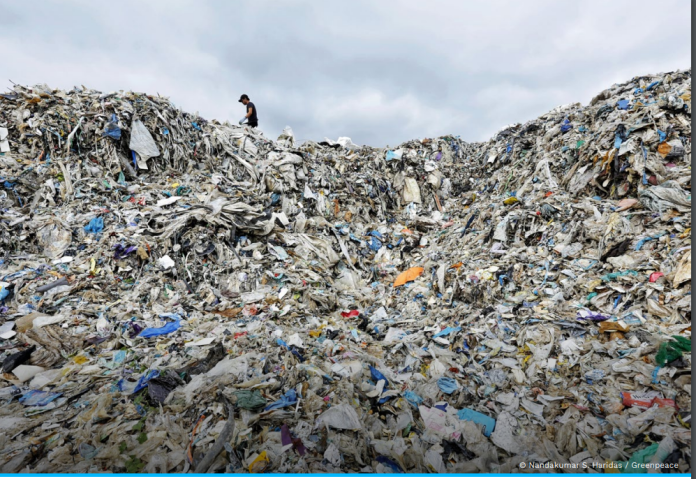
Just ahead of a key fourth Intergovernmental Negotiating Committee (INC-4) meeting for a Global Plastics Treaty to be held in Ottawa, Canada, this month, a new global survey says eight out of 10 people in India support cutting plastic production to save the country’s biodiversity and limit global warming to 1.5 degrees Celsius. Globally too, eight out of 10 people support cutting plastic production to stop plastic pollution.
The new Greenpeace International report indicates that more than 90% of the Indian respondents were concerned about the adverse health effects of plastics on their children’s health.
The survey, which was conducted across 19 countries, indicates overwhelming public backing for measures aimed at ending single-use plastics and promoting reuse-based solutions.
According to the survey, 87% of Indian respondents support cutting the production of plastic to stop plastic pollution while 89% believe that the Global Plastics Treaty should include targets that oblige governments and corporations to transition away from single-use plastic packaging to reusable and refillable packaging.
Eighty percent of the global respondents advocate protecting biodiversity and the climate by reducing plastics production, and 90% endorse transitioning away from single-use plastic packaging to reusable and refillable alternatives. 75% of global respondents support a ban on single-use plastic packaging.
“The survey findings are pivotal in the fight against plastic pollution and climate change. The overwhelming support from 87% of Indians and echoed globally reaffirms our shared commitment to safeguarding our planet’s biodiversity and limiting global warming to 1.5 degrees Celsius,” said Abhishek Kumar Chanchal, project lead, Plastic Free Future, Greenpeace India, in a statement.
Action on plastics
The survey reveals unwavering support for ambitious action on plastics worldwide, especially in regions of the Global South where plastic pollution levels are notably high. A majority of people endorse these measures across all demographics, with 79% of Indian respondents advocating for the exclusion of lobbyists from the fossil fuel and chemical industries from treaty negotiations.
“With over 90% of Indians expressing grave concerns about the health impacts of plastics on our children, it is clear that urgent action is not only desired but imperative. The findings of this survey underscore the overwhelming public demand for transformative measures, including transitioning away from single-use plastics towards reusable and refillable solutions,” Chanchal said.
The Greanpeace research was conducted by Censuswide, from a sample of 19,088 members in the UK, USA, Canada, India, Brazil, Egypt, Germany, Mexico, South Africa, Philippines, Indonesia, Japan, Thailand, South Korea, China, United Arab Emirates, Malaysia, Austria, and Norway. The data was collected between 16 and 26 February 2024.
Graham Forbes, Greenpeace head of delegation to the Global Plastics Treaty negotiations and Global Plastics Campaign Lead for Greenpeace USA, said: “The level of public support demonstrated by this survey sends a clear message: the vast majority of people want a Global Plastics Treaty that cuts plastic production and ends single-use plastic. It is time for world leaders to listen and rise to the occasion. They must stand up to the fossil fuel industry and deliver a strong and ambitious treaty that represents the will of the people, or face significant political repercussions.”
In several countries, there is a significant disconnect between the level of public support for cutting plastic production and the position of their governments on the treaty. Despite having widespread public support for reducing plastic production in India, the Indian government opposes limitations on plastic production.
Focus on INC-4 meeting in Ottawa
Greenpeace has demanded that the Global Plastics Treaty cuts total plastic production by at least 75% by 2040 to protect biodiversity and ensure that global temperatures stay below 1.5° C. Over 99% of plastic is made from fossil fuels, and with production set to skyrocket, it is a significant driver of climate change.
Ahead of the INC-4 meeting for a Global Plastics Treaty, Greenpeace has urged governments and corporations to heed the call of the people by incorporating ambitious targets that promote sustainable alternatives and prioritize the protection of our environment and climate.
Government ministers from 173 countries will gather at the Shaw Centre in Ottawa, Canada from 23 to 29 April 2024, for the INC-4 conference to negotiate a legally binding Treaty. INC-1 was held in Punta del Este, Uruguay, in 2022, followed by INC-2 in Paris in 2023. INC-3 was in Nairobi, Kenya in November 2023.
The INC3 meeting in Nairobi ended in frustration as low-ambition countries derailed the negotiations, with the talks ending without a mandate to create a first draft of the treaty. Instead, the meeting saw the Zero Draft reworked to add weaker options, resulting in a convoluted document.
In Nairobi, a majority of the nations, led by African countries, favored a treaty that had some reduction form of primary polymer production. A few nations, including oil, gas and plastic-producing countries, opposed it.
“There was an organized approach to prevent the treaty from delivering its mandate. These countries questioned the procedures and tried to derail conversation,” said an international expert at a recent meeting to discuss the Nairobi meet.
India urged in an intervention, “It needs no over-emphasis that plastics are useful materials and that the INC should address the pollution caused by plastic… Accordingly, there must be no binding targets/cap on the production of plastic polymers,” CSE expert Siddharth Ghanshyam Singh wrote in a review on Down To Earth.
The last negotiation meeting will happen in Busan, South Korea in November 2024.









